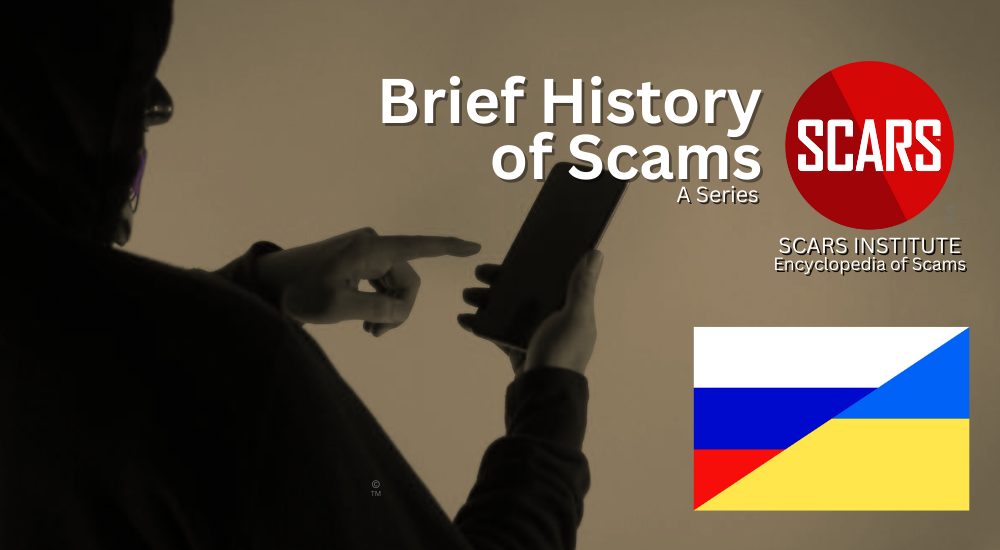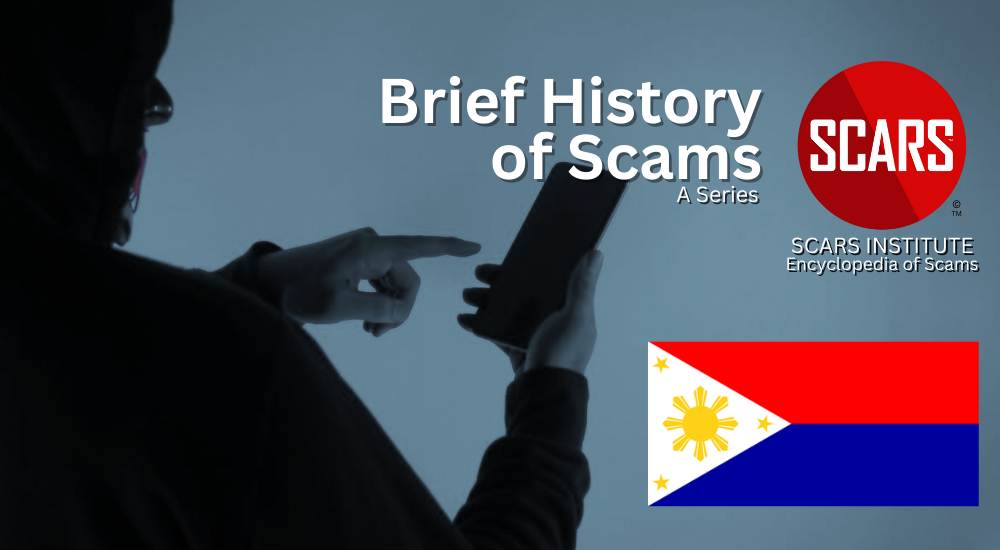
SCARS Institute’s Encyclopedia of Scams™ Published Continuously for 25 Years

A Brief History of Philippines/Filipina Dating/Romance Scams & Scammers
History of Scams- A SCARS Institute Insight
Author:
• SCARS Institute Encyclopedia of Scams Editorial Team – Society of Citizens Against Relationship Scams Inc.
Article Abstract
Filipina online dating scams have their roots in the economic hardship and bar-girl culture that emerged in the Philippines, where women often sought financial support from foreign men. These scams have evolved with the rise of internet access, allowing women to connect with men worldwide. In many cases, these scammers use their real identities but omit critical details, such as being married or in a relationship, to manipulate their victims emotionally and financially.
Scammers build trust over time, asking for money for various needs, such as travel or medical expenses, and prolong the scam by creating new crises to extract more funds. In some cases, even after the scam is discovered, scammers retaliate by hiring attorneys to intimidate victims with legal threats. These tactics are designed to protect the scammer’s identity and prevent further repercussions, as many seek to secure visas and build new lives abroad with the proceeds of their fraudulent activities.

PLEASE NOTE: SCARS Institute is NOT saying that all Filipina women are scammers – far from it. Only that there is a small number who are actively involved in scamming.
A Brief History of Philippines/Filipina Dating & Romance Scams & Scammers
A History of Philippines/Filipina Online Dating Scams
Online dating scams originating from the Philippines, often involving Filipina women, have become increasingly common in recent years. These scams, typically targeting men from Western countries, have roots in the broader socio-economic and cultural landscape of the Philippines. Economic hardship, the rise of internet access, and the questionable morality associated with certain industries, such as bar-girl culture, have contributed to the development of these scams. What began as a survival tactic for many women has evolved into a more widespread method of scamming, sometimes using real identities but withholding critical information like marriage or existing relationships.
Origins: Economic Hardship and Bar-Girl Culture
The rise of online dating scams in the Philippines can be traced back to the challenging socio-economic conditions faced by many Filipinas. Poverty, limited job opportunities, and the desire for a better life have driven some women to seek financial support through relationships with foreign men. This trend is closely tied to the long-standing practice of bar girls—women working in bars, often catering to foreign tourists, and using their charm to build connections with wealthy men in hopes of financial gain.
In the post-World War II era and continuing through the rise of tourism in the 1970s and 1980s, the Philippines saw an influx of foreign men seeking relationships or companionship with local women. The bar scene in tourist-heavy areas like Angeles City and Cebu became notorious for its morally ambiguous environment. Women, often driven by economic necessity, engaged in relationships with these foreign men, hoping for long-term support or marriage. Some of these relationships were genuine, but many were transactional, with the women using charm and emotional appeal to secure financial assistance.
As the internet became more accessible in the early 2000s, this practice shifted to the digital world, giving rise to online dating scams. Bar-girls and others looking for financial support found new opportunities on dating platforms and social media to connect with men from around the world, often portraying themselves as single, innocent women in search of love.
The Role of Real Identities in Scamming
One notable aspect of Filipina dating scams is that many women use their real identities and life stories to engage with foreign men. While scammers in other parts of the world often rely on fake profiles and fabricated backstories, some Filipina women present themselves truthfully in many respects but omit important details—such as being married or already in a committed relationship.
These women may genuinely be looking for financial support but approach the situation dishonestly by misleading men about their availability or relationship status. They maintain emotional relationships with multiple men online, each thinking they are the sole object of affection. These scams can be emotionally devastating for victims, who often believe they are entering a serious relationship, only to find out later that they were being misled.
This dynamic reflects the complex moral landscape that many women in the Philippines navigate. On the one hand, they are seeking better lives for themselves and their families. On the other hand, the dishonest nature of these relationships turns them into scams that exploit the emotions and finances of their victims.
The Evolution of Filipina Romance Scams
Filipina romance scams have evolved over the years, using emotional manipulation and financial exploitation to trap foreign men. These scams typically follow a pattern:
- Initial Contact: A foreign man is contacted by a Filipina woman on an online dating site, social media, or other platforms. The woman may present herself as single, hardworking, and seeking a loving relationship with someone from abroad. Often, the initial conversations are lighthearted and romantic, focusing on shared dreams of love and a future together.
- Building Trust and an Emotional Connection: Over time, the scammer builds a strong emotional bond with the victim. She might share personal details about her life, such as stories about her family, her financial struggles, and her desire to improve her situation. These stories tug at the victim’s heartstrings, making him feel invested in helping her.
- Requesting Financial Support: Once the emotional connection is established, the Filipina begins to ask for financial support. This often starts small—money for food, medicine, or school supplies for her children—and gradually increases over time. As the relationship deepens, the requests may become larger, such as asking for money for travel expenses to visit the victim or pay off debts.
- Continued Manipulation: The scammer continues to extract money by fabricating new crises or needs. She may promise to visit the victim or express a desire to get married, but something always prevents the plans from materializing, usually requiring more money to resolve. The victim is kept on the hook for as long as possible, emotionally and financially drained, but still believing in the prospect of a real relationship.
- Discovery and Disappearance: Eventually, some victims realize they are being scammed, either by uncovering the truth or when the woman disappears without explanation. In some cases, the scammer may reveal that she was already in a relationship or married, leaving the victim feeling betrayed and devastated.
The Dangers Even After the Bride Arrives
In some instances, the scam continues even after the woman arrives in the victim’s country. She may continue to extract money, emotionally manipulate the victim, or, in some cases, involve herself in legal disputes over property or financial assets. Some scammers are part of organized crime rings that use these relationships to gain long-term financial control over victims.
Filipina Scammers Go After Men Who Report Them
Filipina scammers and their families are known to take aggressive steps to protect their schemes, even targeting men who report them. In some cases, after being exposed, scammers will escalate the situation by hiring attorneys (usually relatives) in the victim’s country to send threatening legal notices, often claiming defamation or some such. These legal threats are designed to intimidate the victim into silence, preventing them from taking further action or warning others.
This tactic can make victims feel trapped, fearing legal consequences while already dealing with the emotional and financial fallout of the scam. These threats are part of the scammer’s broader strategy to maintain control and exploit their victims.
The purpose of the tactic is to prevent the scammers from being identified so that they might be denied visas to the United States, Canada, Europe, or other countries since some of them travel. Often their goal is to scam enough to pay for a new life in the United States or elsewhere. For example, SCARS had to stop displaying photos of Filipinas due to threats and complaints to search engines – however, SCARS does make sure that every scammer reported to AnyScam.com is communicated to the appropriate authorities.
Was It A Crime?
One of the great challenges with this type of romance scam is to prove it was a scam! Because the women are using their real names and every aspect of the relationship was in the open (except for some details, such as marriage or multiple men) the police tend to look at these crimes as not really crimes. They tend to view them as a relationship that ended badly. This makes it very difficult for male victims to feel any sense of justice.
Summary
Filipina online dating scams have evolved from the bar-girl culture of the past, driven by economic hardship and the desire for financial stability. While some women use real identities and legitimate life stories, their manipulation of foreign men—especially through the omission of their true relationship status—turns these interactions into emotionally and financially harmful scams. Understanding the patterns and dynamics of these scams is essential for protecting oneself from becoming a victim.
-/ 30 /-
What do you think about this?
Please share your thoughts in a comment below!
Table of Contents
- Article Abstract
- A Brief History of Philippines/Filipina Dating & Romance Scams & Scammers
- A History of Philippines/Filipina Online Dating Scams
- Origins: Economic Hardship and Bar-Girl Culture
- The Role of Real Identities in Scamming
- The Evolution of Filipina Romance Scams
- The Dangers Even After the Bride Arrives
- Filipina Scammers Go After Men Who Report Them
- Was It A Crime?
- Summary
LEAVE A COMMENT?
Recent Comments
On Other Articles
- Arwyn Lautenschlager on Love Bombing And How Romance Scam Victims Are Forced To Feel: “I was love bombed to the point that I would do just about anything for the scammer(s). I was told…” Feb 11, 14:24
- on Dani Daniels (Kira Lee Orsag): Another Scammer’s Favorite: “You provide a valuable service! I wish more people knew about it!” Feb 10, 15:05
- on Danielle Delaunay/Danielle Genevieve – Stolen Identity/Stolen Photos – Impersonation Victim UPDATED 2024: “We highly recommend that you simply turn away form the scam and scammers, and focus on the development of a…” Feb 4, 19:47
- on The Art Of Deception: The Fundamental Principals Of Successful Deceptions – 2024: “I experienced many of the deceptive tactics that romance scammers use. I was told various stories of hardship and why…” Feb 4, 15:27
- on Danielle Delaunay/Danielle Genevieve – Stolen Identity/Stolen Photos – Impersonation Victim UPDATED 2024: “Yes, I’m in that exact situation also. “Danielle” has seriously scammed me for 3 years now. “She” (he) doesn’t know…” Feb 4, 14:58
- on An Essay on Justice and Money Recovery – 2026: “you are so right I accidentally clicked on online justice I signed an agreement for 12k upfront but cd only…” Feb 3, 08:16
- on The SCARS Institute Top 50 Celebrity Impersonation Scams – 2025: “Quora has had visits from scammers pretending to be Keanu Reeves and Paul McCartney in 2025 and 2026.” Jan 27, 17:45
- on Scam Victims Should Limit Their Exposure To Scam News & Scammer Photos: “I used to look at scammers photos all the time; however, I don’t feel the need to do it anymore.…” Jan 26, 23:19
- on After A Scam, No One Can Tell You How You Will React: “This article was very informative, my scams happened 5 years ago; however, l do remember several of those emotions and/or…” Jan 23, 17:17
- on Situational Awareness and How Trauma Makes Scam Victims Less Safe – 2024: “I need to be more observant and I am practicing situational awareness. I’m saving this article to remind me of…” Jan 21, 22:55
ARTICLE META
Important Information for New Scam Victims
- Please visit www.ScamVictimsSupport.org – a SCARS Website for New Scam Victims & Sextortion Victims
- Enroll in FREE SCARS Scam Survivor’s School now at www.SCARSeducation.org
- Please visit www.ScamPsychology.org – to more fully understand the psychological concepts involved in scams and scam victim recovery
If you are looking for local trauma counselors please visit counseling.AgainstScams.org or join SCARS for our counseling/therapy benefit: membership.AgainstScams.org
If you need to speak with someone now, you can dial 988 or find phone numbers for crisis hotlines all around the world here: www.opencounseling.com/suicide-hotlines
A Note About Labeling!
We often use the term ‘scam victim’ in our articles, but this is a convenience to help those searching for information in search engines like Google. It is just a convenience and has no deeper meaning. If you have come through such an experience, YOU are a Survivor! It was not your fault. You are not alone! Axios!
A Question of Trust
At the SCARS Institute, we invite you to do your own research on the topics we speak about and publish, Our team investigates the subject being discussed, especially when it comes to understanding the scam victims-survivors experience. You can do Google searches but in many cases, you will have to wade through scientific papers and studies. However, remember that biases and perspectives matter and influence the outcome. Regardless, we encourage you to explore these topics as thoroughly as you can for your own awareness.
Statement About Victim Blaming
SCARS Institute articles examine different aspects of the scam victim experience, as well as those who may have been secondary victims. This work focuses on understanding victimization through the science of victimology, including common psychological and behavioral responses. The purpose is to help victims and survivors understand why these crimes occurred, reduce shame and self-blame, strengthen recovery programs and victim opportunities, and lower the risk of future victimization.
At times, these discussions may sound uncomfortable, overwhelming, or may be mistaken for blame. They are not. Scam victims are never blamed. Our goal is to explain the mechanisms of deception and the human responses that scammers exploit, and the processes that occur after the scam ends, so victims can better understand what happened to them and why it felt convincing at the time, and what the path looks like going forward.
Articles that address the psychology, neurology, physiology, and other characteristics of scams and the victim experience recognize that all people share cognitive and emotional traits that can be manipulated under the right conditions. These characteristics are not flaws. They are normal human functions that criminals deliberately exploit. Victims typically have little awareness of these mechanisms while a scam is unfolding and a very limited ability to control them. Awareness often comes only after the harm has occurred.
By explaining these processes, these articles help victims make sense of their experiences, understand common post-scam reactions, and identify ways to protect themselves moving forward. This knowledge supports recovery by replacing confusion and self-blame with clarity, context, and self-compassion.
Additional educational material on these topics is available at ScamPsychology.org – ScamsNOW.com and other SCARS Institute websites.
Psychology Disclaimer:
All articles about psychology and the human brain on this website are for information & education only
The information provided in this article is intended for educational and self-help purposes only and should not be construed as a substitute for professional therapy or counseling.
While any self-help techniques outlined herein may be beneficial for scam victims seeking to recover from their experience and move towards recovery, it is important to consult with a qualified mental health professional before initiating any course of action. Each individual’s experience and needs are unique, and what works for one person may not be suitable for another.
Additionally, any approach may not be appropriate for individuals with certain pre-existing mental health conditions or trauma histories. It is advisable to seek guidance from a licensed therapist or counselor who can provide personalized support, guidance, and treatment tailored to your specific needs.
If you are experiencing significant distress or emotional difficulties related to a scam or other traumatic event, please consult your doctor or mental health provider for appropriate care and support.
Also read our SCARS Institute Statement about Professional Care for Scam Victims – click here to go to our ScamsNOW.com website.
















Thank you for your comment. You may receive an email to follow up. We never share your data with marketers.